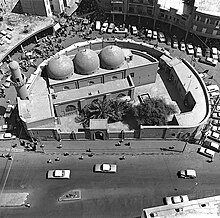Nu'man al-Alusi
This references needs translation from Arabic to English. This references is written in Arabic. If it is intended for readers from the Arabic language community, it should be contributed to the Arabic Wikipedia. See the list of Wikipedias. Please see this article's entry on Pages needing translation into English for discussion. If the references is not rewritten in English within the next two weeks it will be listed for deletion and/or moved to the Arabic Wikipedia. If you want to assess this article, you may want to check its Google translation. However, please do not add an automated translation to the article, since these are generally of very poor quality. |
Nu'man al-Alusi | |
|---|---|
 A manuscript written and signed by Nu'man al-Alusi, which he dedicated to his teacher Mullah Qasim Effendi. | |
| Personal life | |
| Born | Abu al-Barakat Khayr al-Din Nu'man bin Mahmud al-Alusi 1836 |
| Died | 1899 Baghdad, Kingdom of Iraq |
| Resting place | Murjan Mosque, Baghdad, Iraq |
| Occupation | Islamic scholar, jurist and calligrapher |
| Religious life | |
| Religion | Islam |
| Denomination | Sunni Islam |
| Jurisprudence | Independent (with influence from the Hanafi and Shafi'i schools) |
| Creed | Athari |
| Movement | Salafism |
| Muslim leader | |
Influenced by | |
Influenced | |
Nu'man al-Alusi (Arabic: نعمان الآلوسي, 1836–1899), full name Khayr al-Din Nu'man bin Mahmud al-Alusi, was a 19th-century Iraqi Muslim scholar, jurist and calligrapher.[1][2][3][4] The son of the widely acclaimed Hanafi jurist, Mahmud al-Alusi, Nu'man was born in Baghdad.[1][2][3][4] He later rose to prominence himself as an early supporter of the Salafi movement, which was slowly spreading at the time.[1][2][3][4][5]
Muhammad Bahjat Athari described Nu'man al-Alusi as “Generous, loyal, ascetic, sweet as a fruit, and a forgiving person.”[1][2][3][4] He was also praised by Jamal al-Din al-Qasimi, while he was also credited by Al-Albani in the introduction of his book Sharh al-Ayat al-Bayinat fi Iyadam Sama'i al-Amwat.[3]
Biography
[edit]Nu'man al-Alusi was one of Mahmud al-Alusi's scholarly sons.[1][2][3][4][6] At first, he took knowledge from his own father, but later on as he grew up he became a student of Mullah Qasim Effendi.[2][3][4][6] He served as a qadi (Islamic judge) in several towns, including Hillah.[3][5][6] In the year 1878, Nu'man al-Alusi travelled to Egypt where he studied the works of Siddiq Hasan Khan, a prominent Indian Muslim scholar of the Ahlul Hadith movement.[1][3][7][6] Siddiq Hassan Khan's works were one of those which influenced the ideology and thinking process of Nu'man.[7][6][8] Later in 1882, he migrated to Istanbul, Turkey, but he stayed for two years only.[1][3][4][6] After his stay, he returned to his hometown with the title of Muda'ir al-Madrasa (head teacher).[1][3][4][6]
Nu'man al-Alusi was one of the famous calligraphers of his time, and he took up the hobby of calligraphy from his father.[1][3][4][6] He was fluent in the Rayhani script, and he wrote letters and books in this form.[1][4][3][6] Some of his work is preserved in the archives of the public libraries in Baghdad.[1][3][4][6]

Nu'man al-Alusi died in Baghdad at the age of 63, and he was buried in the grounds of the Murjan Mosque.[1][4][6]
Views and teachings
[edit]Nu'man al-Alusi was one of the early advocates of the Salafi movement.[1][2][4][5][9] However, he also became affiliated with Naqshbandi order of Sufism. His book Jala' al-'Aynayn was intended to serve as a guidebook or manual to the Athari creed, which was conflated with Salafism at the time.[10][11][12] It featured quotes from the Hanbali theologian Ibn Taymiyyah.[13][10][11][12] Siddiq Hasan Khan mistakenly considered Nu'man al-Alusi a Maturidi but his verdict was not well-known or widespread.[13]
Works
[edit]Among his works include;
- Jala' al-'Aynayn fi Muhakamat al-'Ahmadayn
- Al-Ayat al-Bayinat fi Iyadam Sama'i al-Amwat (The Clear Verses on whether the Dead can Hear You)
- 'Akmal al-Kitab al-Hadiqat al-Wurud (The complete book of the Rose Gardens)
- Al-Jawab al-Fasih lima lafaqqahu 'Abd al-Masih (Detailed Response in refutation of 'Abdul-Masih)
See also
[edit]References
[edit]- ^ a b c d e f g h i j k l m التاريخ, تراحم عبر. "نعمان بن محمود بن عبد الله أبي البركات خير الدين الآلوسي". tarajm.com (in Arabic). Retrieved 2024-04-13.
- ^ a b c d e f g "ابن الألوسي - المكتبة الشاملة". shamela.ws. Retrieved 2024-04-13.
- ^ a b c d e f g h i j k l m n "العلامة الأثري النعمان الآلوسي". www.alukah.net (in Arabic). 2007-07-01. Retrieved 2024-04-13.
- ^ a b c d e f g h i j k l m "The biography of Khayr al-Din Nu'man al-Alusi, an Iraqi scholar".
- ^ a b c "ÂLÛSÎ, Nu'mân b. Mahmûd". TDV İslâm Ansiklopedisi (in Turkish). Retrieved 2024-04-13.
- ^ a b c d e f g h i j k "رابطة العلماء السوريين | من عبر التاريخ | حدث في الثاني عشر من المحرم ولادة خير الدين نعمان الآلوسي". islamsyria.com. Retrieved 2024-04-14.
- ^ a b admin (2021-12-12). "Qadi Yusuf al-Nabhani (d. 1932 CE/1350 AH) on the Jala al-Aynayn of Nu'man al-Alusi - Darul Tahqiq". Retrieved 2024-04-13.
- ^ "نعمان بن محمود الألوسي". 1000-islam-final. Retrieved 2024-04-14.
- ^ Ālūsī, Maḥmūd Shukrī (1980). Ghayat Al-amani Fi ʼl-radd ʻala ʼl-Nabhani. Jamiʻat al-ʻUlum al-Athariyya.
- ^ a b Nafi, Basheer M. (2009). "Salafism Revived: Nu'mān al-Alūsī and the Trial of Two Aḥmads". Die Welt des Islams. 49 (1): 49–97. ISSN 0043-2539. JSTOR 27798281.
- ^ a b Haq, Asim ul (2016-09-04). "The praise of the muftis of four Madahib on Jala al Aynayn | Islam". systemoflife.com. Retrieved 2024-04-13.
- ^ a b Cherry-Tech. "الشيخ النعمان الالوسي زاده، رحمه الله، وجهوده في خدمة الدعوة الى الله تعالى ، دراسة تحليلية". المستودع الدعوي الرقمي. Retrieved 2024-04-14.
- ^ a b "Alusi Misquoting Imam al-Munawi on Ibn Taymiyya - Darul Tahqiq". 2021-08-05. Retrieved 2024-04-13.
